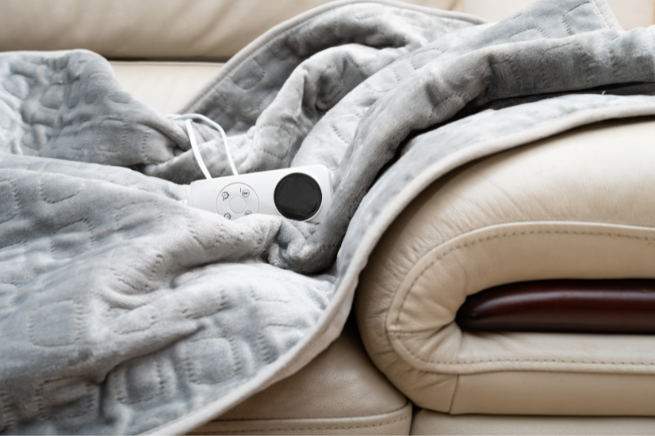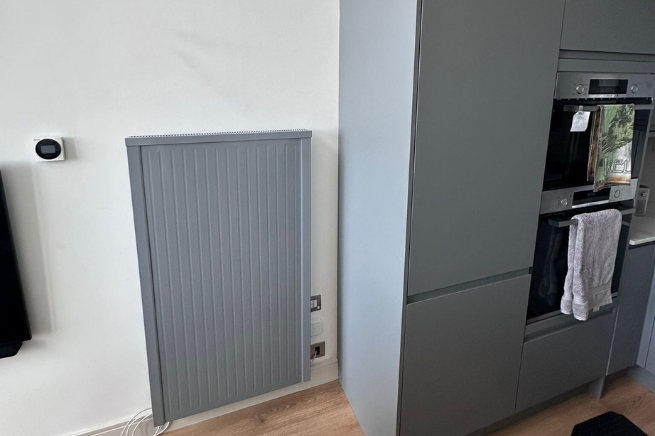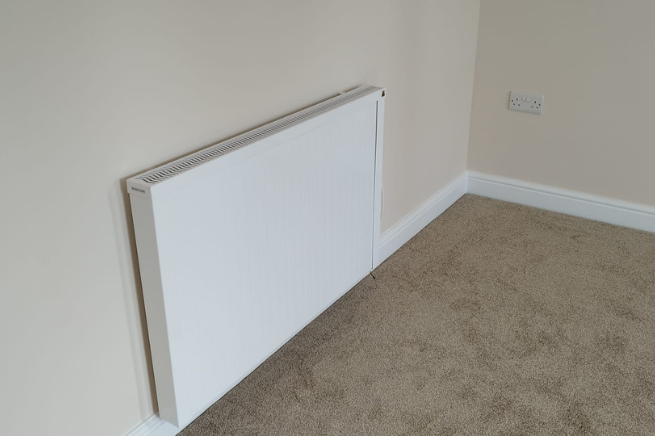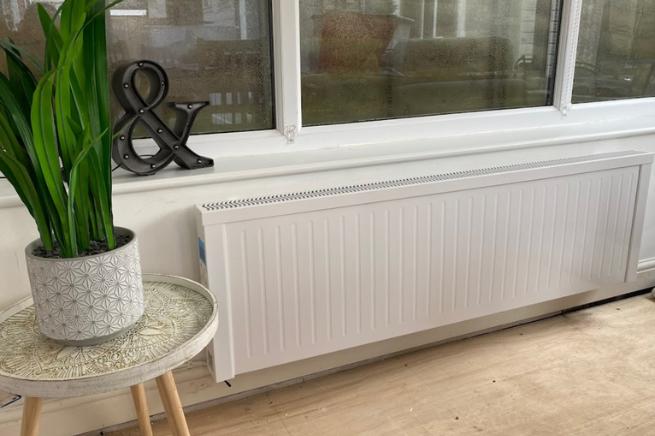
Wondering if electric heaters are really safe? It’s a question that pops up a lot, especially with all the scare stories of electric fan heaters and electric blankets catching fire. True, cheaper and supplementary heating methods can pose dangers, but it’s also true that there are safe electric heating options on the market. Let’s explore this and set the record straight.

Let’s start with where most of the safety concerns come from: Portable electric heaters such as fan heaters and panel radiators, and electric blankets. These electric heaters are popular for their convenience and quick warmth, but they do come with some caveats. If not used correctly, overused, or of poor quality, there’s a risk of fire hazards and electric shocks. These kind of incidents and fires are what can give electric heating a bad name. However, it’s important to note that with proper usage and precautions, these risks can be minimised.
Stay clear of water: Keep your portable heaters and electric blankets away from water sources. Even a small amount of moisture can be a risk when electricity is involved, so it’s best to keep these devices away from water to ensure your safety.
Don’t leave your electric heater unattended: Never leave your heaters or blankets on unattended, this is one of the easiest ways to prevent potential accidents.
Don’t use them as a drying rack: While you might be tempted to dry your clothes on your electric panel heater, don’t! This poses a huge fire risk.
Check for damage: Regularly inspect your portable heaters and blankets, especially if you use them often. Any signs of frayed wires, loose connections, and wear and tear can be hazardous.
Placement is key: It’s essential to position your portable heaters on a stable and level surface where they won’t be easily tipped over. Additionally, ensure there’s sufficient clear space around the heater. This not only optimises the heater’s ability to warm your room effectively but also prevents debris from being drawn into the heater, which could pose a hazard.
Follow manufacturer’s instructions: This might seem obvious, but it’s often overlooked. Always follow the guidelines provided by the manufacturer for safe operation. If the instructions say not to plug your heater into an extension lead, don’t do it!

If you rely on you electric heaters to heat your home over the winter, it may be worth installing an electric heating system you can safely rely on. While it may seem expensive upfront, they’re a long term investment. And you may find that some electric heating systems reduce your electricity bills, sounds too good to be true right? Let’s explore
If you depend on electric heaters to keep your home cosy during winter, consider investing in a reliable electric heating system. Yes, there’s an upfront cost, but think of it as a long-term investment. Surprisingly, some electric heating systems can actually help reduce your electricity bills. Sounds almost too good to be true, right? Let’s delve into why electric radiators could be the safe, efficient, and cost-effective solution you’re looking for.
When it comes to electric radiators, safety is a top priority. Electric radiators like the NEOS are designed with safety in mind, including built in thermal trips which ensure that if anything gets placed on top of the radiator or if there is a fault - the radiator will disconnect power until the radiator is at a lower temperature or fixed.
Wall-Mountable Design: Electric radiators are typically mounted on the wall, which means they’re not going to get knocked over. This design significantly reduces the risk of accidents compared to portable heaters.
No Gas or Carbon Monoxide Risks: One of the biggest advantages of electric radiators is that they operate without gas. This means there’s no risk of gas leaks or carbon monoxide poisoning, making them a safer choice for your home.
CE Approved: Most electric radiators, like the NEOS, are CE approved, ensuring they meet high safety and quality standards. This approval is a testament to their reliability and safety.
Trip Protection: The NEOS electric radiator comes equipped with trip protection. This feature ensures that if anything gets placed on top of the radiator or if there is a fault - the radiator will disconnect power until the radiator is at a lower temperature or fixed.

Part of the reason we buy portable electric heaters is their price, they’re cheap and they do the job. So you may be wondering how investing in an electric heating system can save you money. Well, we’ve tested it through our knowledge transfer partnership with the University of Huddersfield. Let’s break it down:
Energy Efficiency: While all electric heaters are ‘100% efficient’ at converting electrical energy into heat, models like the NEOS take efficiency a step further. They heat up your room quicker and don’t require constant electricity to release heat. This efficient operation means less energy waste compared to traditional heating systems, making them a smarter choice for both your comfort and your energy bills. You can read more about this here.
Precise Temperature Control: With advanced thermostatic controls, electric radiators allow you to set the exact temperature you need. This precision avoids the energy waste associated with overheating your space.
Zonal Heating Flexibility: Unlike central heating systems that heat the entire house, electric radiators can be used to heat only the rooms you’re using. This zonal approach means you’re not paying to heat empty spaces.
Reduced Maintenance Costs: Electric radiators require far less maintenance than gas boilers. With fewer moving parts and no need for annual safety checks, you’re saving on upkeep costs.
For more detail on running cost’s, you can read our running cost guide which was developed through testing with the University of Huddersfield below.

In summary, electric heaters’ safety depends on proper usage and precautions, especially for portable ones like fan heaters and electric blankets. Following guidelines, such as avoiding water exposure, not leaving them unattended, and regular inspections, can minimise fire risks.
Electric radiators provide a safer alternative with built-in safety features, including thermal trips and CE approval. They are also cost-effective, offering energy efficiency, precise temperature control, and zonal heating flexibility, reducing long-term maintenance costs. When choosing electric heating, prioritise and consider the potential savings for a well-informed decision.
Tags: General Guides, Understanding Heating.

If you are considering electric heating/electric radiators, then this guide tells you everything you need to know. Discover this modern, sustainable and economical method of heating that gives you complete control and comfort. Download Free Guide now.

*Trust Electric Heating needs the contact information you provide to us to contact you about our products and services. You may unsubscribe from these communications at any time. For information on how to unsubscribe, as well as our privacy practices and commitment to protecting your privacy, check out our Privacy Policy.
Quick installation and a 100 day warmth guarantee. Whether you’re buying one or several radiators, if our radiators don’t heat your room to a minimum of 20 degrees we will undertake to upgrade or replace the radiators free of charge.
Book your free consultation